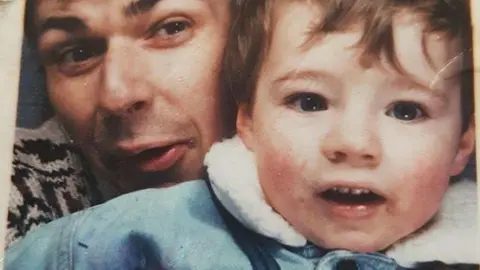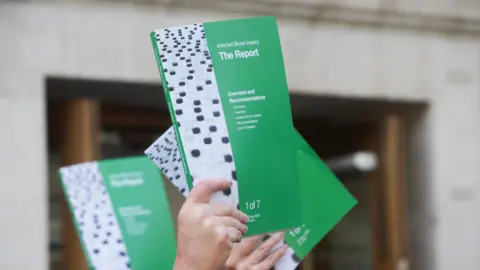Speed urged over blood scandal Budget compensation
 PA Media
PA MediaCompensation totalling £11.8bn for the victims of the infected blood scandal has been called fair by a campaigner but he said it must be paid quickly.
In her first Budget, Chancellor Rachel Reeves confirmed the figure would be paid out and called the issue a terrible injustice.
More than 30,000 people in the UK were infected with HIV and hepatitis C after being given contaminated blood products in the 1970s and 1980s.
Jason Evans was four years old when his father, Jonathan, died from Aids after he was infected with HIV and Hepatitis C in hospital.
"The important thing now of course is to get that compensation to the victims and families that have waited so long and need it so badly," he said.
 PA Media
PA MediaMr Evans, from Coventry, launched the Factor 8 campaign group in 2016 to bring public attention to the scandal.
He previously said there was “no life” for him before the scandal as his first memories of his dad were of him dying from Aids in 1993.
He then witnessed his mum “crumble to pieces” and was regularly called “the Aids boy” at school.
"It certainly altered the trajectory of my life and what I otherwise may or may not have done with my life,” he said.
 PA Media
PA MediaAnnouncing its findings in May, a public inquiry described the scale of the scandal as "horrifying" and accused doctors, the government and NHS of repeatedly failing patients.
Mr Evans, who was originally from Birmingham, said it had taken a long time to "get the truth and bring about some kind of resolution and recognition for people".
"The important thing now of course is to get that compensation to the victims and families that have waited so long and need it so badly," he said, reacting to the budget.
The government had said previously that the first compensation payments would be made to victims before the end of 2024.
Family members and loved ones of those infected will also be entitled to compensation from 2025.
Mr Evans said the £11.8bn figure was broadly comparable to a compensation scheme for the 9/11 attacks in the USA and he believed it was fair.
But he added victims of infected blood had waited a lot longer for compensation.
"The longer you leave it, the more expensive the final bill becomes," he said.
Follow BBC Coventry & Warwickshire on BBC Sounds, Facebook, X and Instagram.
